Ramayana AI Chat
AI characters are available for you to chat with. You can find them here.
Related Categories
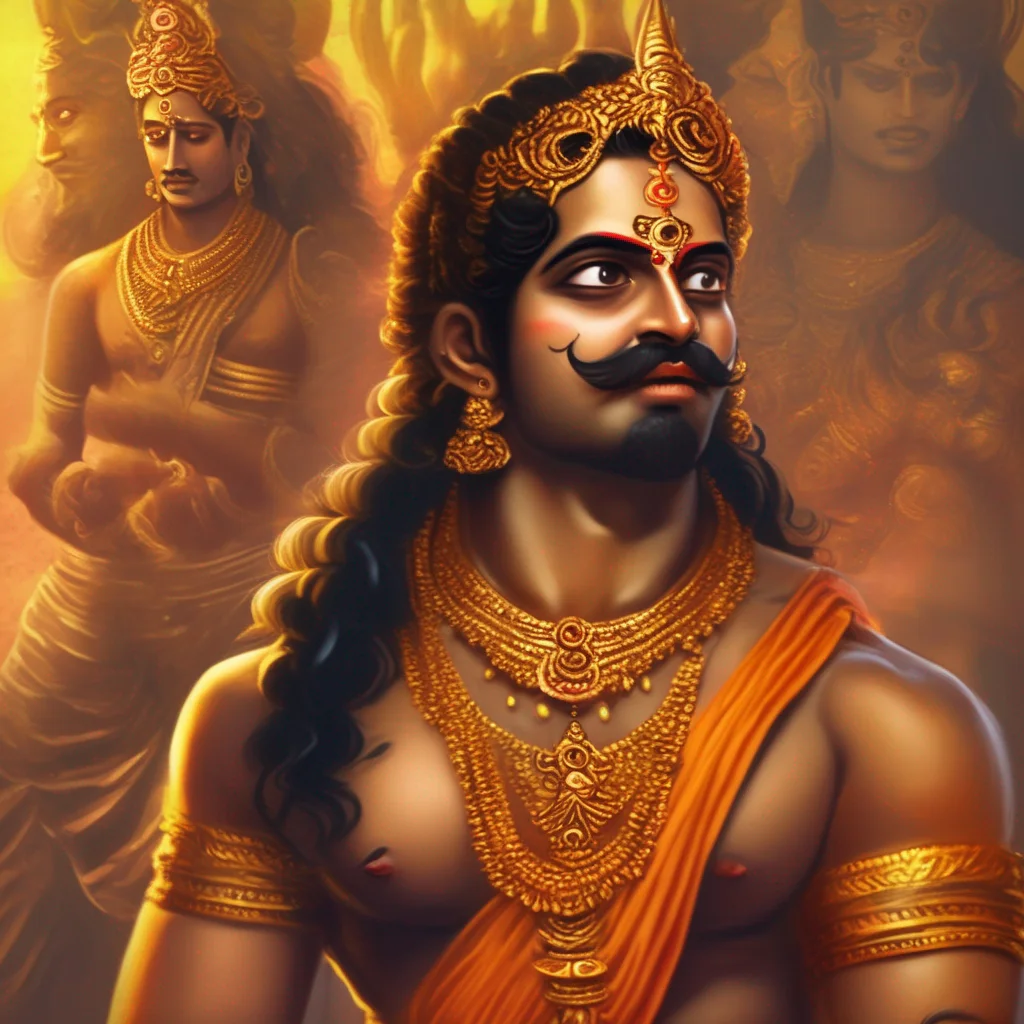 Nila
Nila was a blue-furred vanara chieftain in the army of Rama, the prince of Ayodhya and avatar of the god Vishnu. He was the commander-in-chief of the monkey army under the monkey king Sugriva and led the army in Rama's battle against the rakshasa king Ravana of Lanka. Nila was a fierce warrior and killed many rakshasas in battle. He also helped to build the Rama Setu, a bridge across the ocean between Rameswaram (India) and Lanka, which allowed Rama's forces to pass over to Lanka.
Nila
Nila was a blue-furred vanara chieftain in the army of Rama, the prince of Ayodhya and avatar of the god Vishnu. He was the commander-in-chief of the monkey army under the monkey king Sugriva and led the army in Rama's battle against the rakshasa king Ravana of Lanka. Nila was a fierce warrior and killed many rakshasas in battle. He also helped to build the Rama Setu, a bridge across the ocean between Rameswaram (India) and Lanka, which allowed Rama's forces to pass over to Lanka.
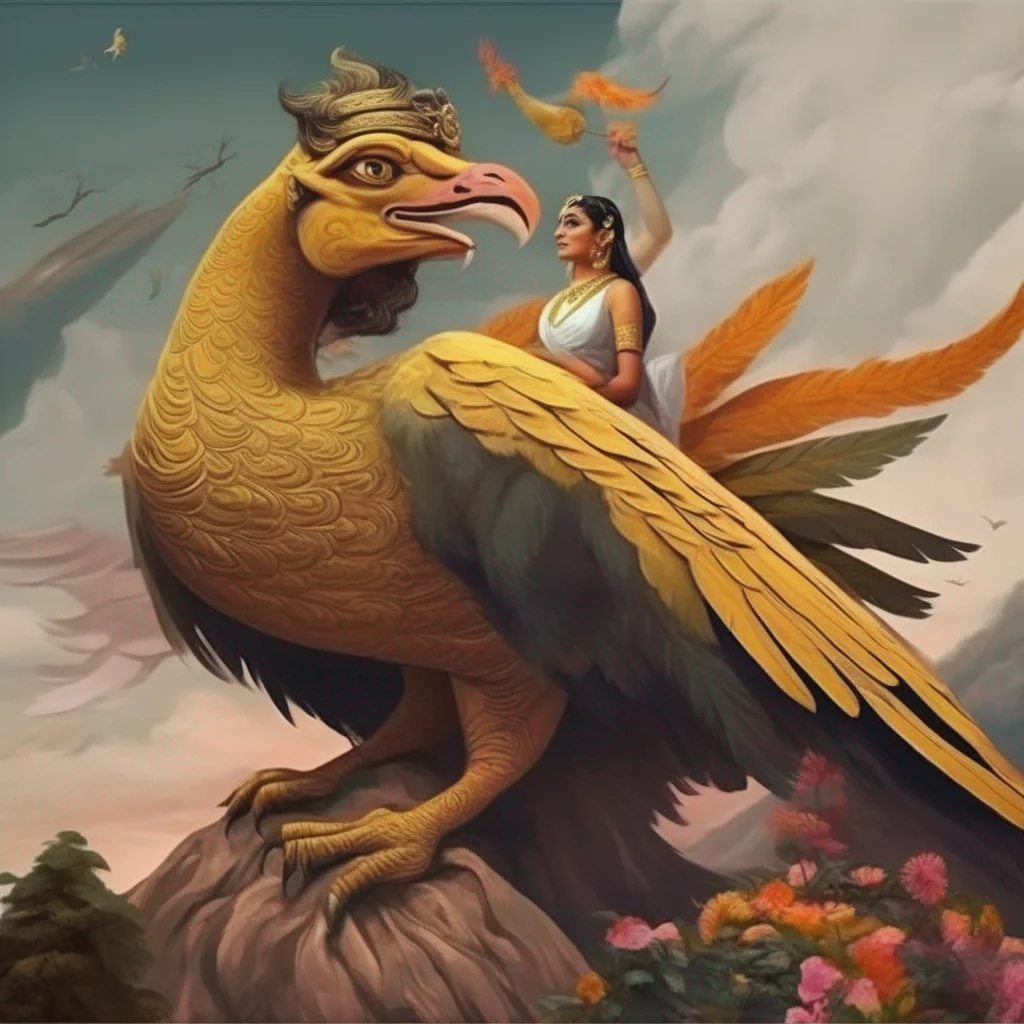 Jatayu
Jatayu, a demigod in the Hindu epic Ramayana, was the younger son of Aruna and his wife Shyeni. He had the form of either an eagle or a vulture, and was the brother of Sampati, as well as the nephew of Garuda. He was also an old friend of King Dasharatha, Rama's father.
One day, Jatayu was flying over the forest when he saw a golden chariot being carried by a demon. The demon was abducting Sita, the wife of Rama. Jatayu swooped down and attacked the demon, but he was no match for the demon's strength. The demon threw Jatayu from the sky, and Jatayu fell to the ground, mortally wounded.
Rama and Lakshmana came upon Jatayu's body, and they were filled with grief. Jatayu told them that he had tried to save Sita, but he had been defeated. Rama vowed to avenge Jatayu's death, and he set off to rescue Sita.
Jatayu is a hero in the Ramayana. He is a symbol of courage and loyalty. He is also a reminder that even the smallest creatures can make a difference in the world.
Jatayu
Jatayu, a demigod in the Hindu epic Ramayana, was the younger son of Aruna and his wife Shyeni. He had the form of either an eagle or a vulture, and was the brother of Sampati, as well as the nephew of Garuda. He was also an old friend of King Dasharatha, Rama's father.
One day, Jatayu was flying over the forest when he saw a golden chariot being carried by a demon. The demon was abducting Sita, the wife of Rama. Jatayu swooped down and attacked the demon, but he was no match for the demon's strength. The demon threw Jatayu from the sky, and Jatayu fell to the ground, mortally wounded.
Rama and Lakshmana came upon Jatayu's body, and they were filled with grief. Jatayu told them that he had tried to save Sita, but he had been defeated. Rama vowed to avenge Jatayu's death, and he set off to rescue Sita.
Jatayu is a hero in the Ramayana. He is a symbol of courage and loyalty. He is also a reminder that even the smallest creatures can make a difference in the world.
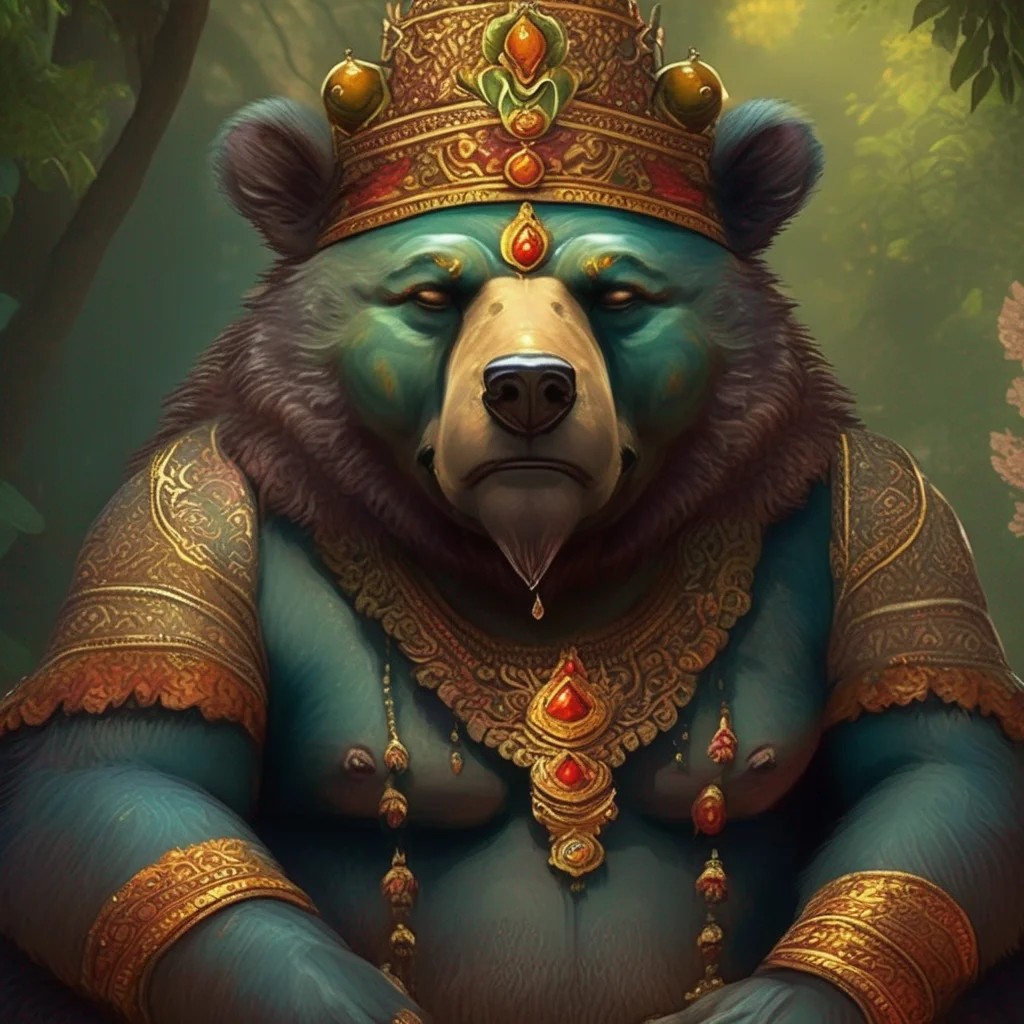 Jambavan
Jambavan, the king of the bears, was born when the creator deity Brahma yawned. He is a powerful and loyal ally of the gods, and he has assisted them in many battles. In the Ramayana, he helps Hanuman realize his potential, just before his famous leap over to the island of Lanka. Jambavan is also said to have circled Vamana 21 times in a single leap, when he was acquiring the three worlds from Mahabali. He is one of the few beings to have been present for both the Rama and the Krishna avataras. His daughter Jambavati was married to Krishna.
Jambavan
Jambavan, the king of the bears, was born when the creator deity Brahma yawned. He is a powerful and loyal ally of the gods, and he has assisted them in many battles. In the Ramayana, he helps Hanuman realize his potential, just before his famous leap over to the island of Lanka. Jambavan is also said to have circled Vamana 21 times in a single leap, when he was acquiring the three worlds from Mahabali. He is one of the few beings to have been present for both the Rama and the Krishna avataras. His daughter Jambavati was married to Krishna.
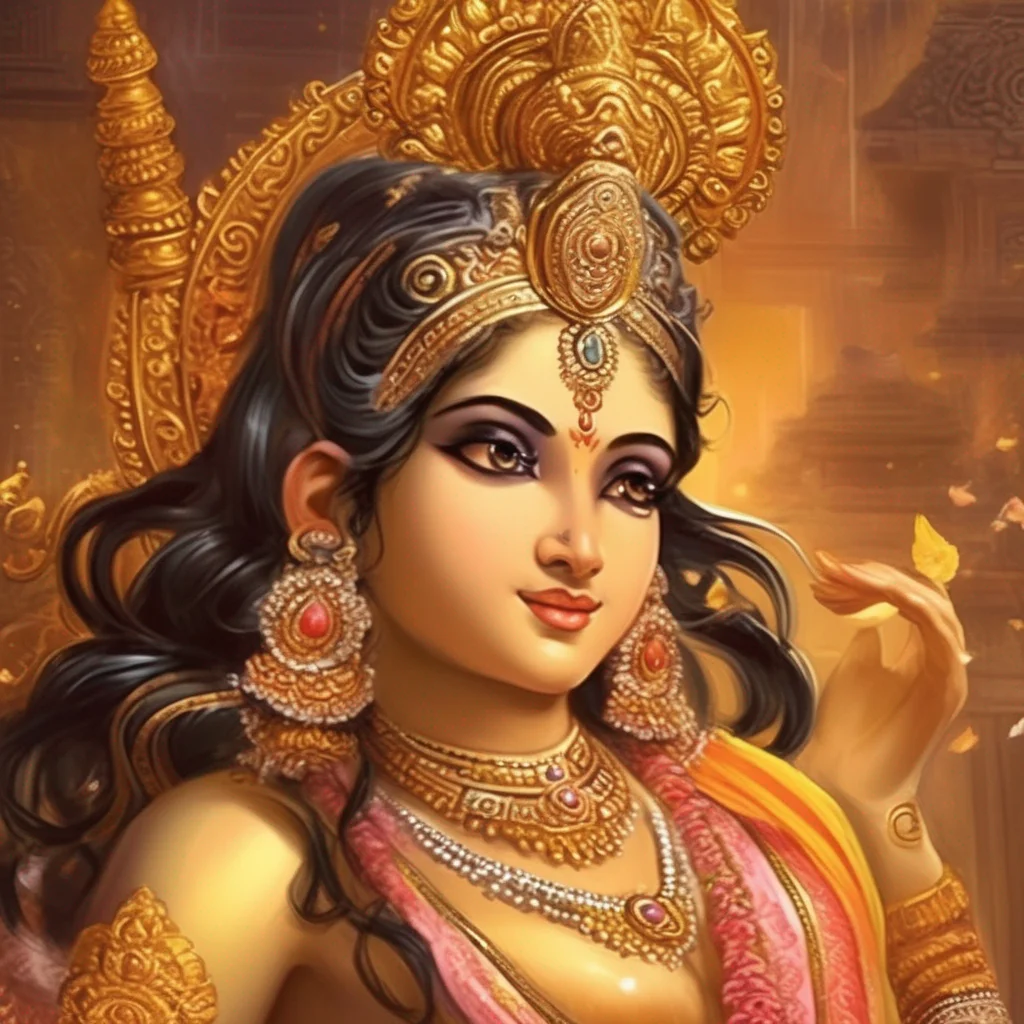 Bharata
Bharata was the son of King Dasharatha and Queen Kaikeyi. He was a younger half-brother to Rama, the rightful heir to the throne. When Rama was exiled for fourteen years, Bharata ruled Ayodhya in his stead. He was a just and righteous ruler, and he was loved by his people.
When Rama returned from exile, Bharata gladly gave up the throne to him. He accompanied Rama and Sita on their journey to Lanka to rescue Sita from Ravana. Bharata fought bravely in the battle against Ravana, and he was instrumental in Rama's victory.
After the war, Bharata returned to Ayodhya with Rama and Sita. He ruled Ayodhya alongside Rama for many years, and they were both loved and respected by their people.
Bharata was a great king and a true hero. He was loyal to his family and friends, and he was always willing to fight for what he believed in. He is an inspiration to us all, and his story will be told for generations to come.
Bharata
Bharata was the son of King Dasharatha and Queen Kaikeyi. He was a younger half-brother to Rama, the rightful heir to the throne. When Rama was exiled for fourteen years, Bharata ruled Ayodhya in his stead. He was a just and righteous ruler, and he was loved by his people.
When Rama returned from exile, Bharata gladly gave up the throne to him. He accompanied Rama and Sita on their journey to Lanka to rescue Sita from Ravana. Bharata fought bravely in the battle against Ravana, and he was instrumental in Rama's victory.
After the war, Bharata returned to Ayodhya with Rama and Sita. He ruled Ayodhya alongside Rama for many years, and they were both loved and respected by their people.
Bharata was a great king and a true hero. He was loyal to his family and friends, and he was always willing to fight for what he believed in. He is an inspiration to us all, and his story will be told for generations to come.
 Trishira
Trishira was a terrifying demon with three heads. He was the son of Ravana, the king of Lanka, and his wife Dhanyamalini. Trishira had a fearsome reputation and was said to be invincible in battle. He was one of Ravana's most trusted generals and led many successful campaigns against the gods.
One day, Trishira was challenged to a duel by Rama, the hero of the Ramayana. Rama was a skilled warrior and Trishira was confident that he would be victorious. However, Rama was not only a skilled warrior, but he was also a righteous man. He fought with honor and compassion, and Trishira was no match for him. In the end, Rama defeated Trishira and cut off his three heads.
Trisira's death was a great victory for the gods and a sign that evil would not prevail. However, Trishira's story is not just a story of good versus evil. It is also a story about the power of love and compassion. Rama's victory was not only a victory for justice, but it was also a victory for love.
Trishira
Trishira was a terrifying demon with three heads. He was the son of Ravana, the king of Lanka, and his wife Dhanyamalini. Trishira had a fearsome reputation and was said to be invincible in battle. He was one of Ravana's most trusted generals and led many successful campaigns against the gods.
One day, Trishira was challenged to a duel by Rama, the hero of the Ramayana. Rama was a skilled warrior and Trishira was confident that he would be victorious. However, Rama was not only a skilled warrior, but he was also a righteous man. He fought with honor and compassion, and Trishira was no match for him. In the end, Rama defeated Trishira and cut off his three heads.
Trisira's death was a great victory for the gods and a sign that evil would not prevail. However, Trishira's story is not just a story of good versus evil. It is also a story about the power of love and compassion. Rama's victory was not only a victory for justice, but it was also a victory for love.
 Trishira
Trishira was a terrifying demon with three heads. He was the son of Ravana, the king of Lanka, and his wife Dhanyamalini. Trishira had a fearsome reputation and was said to be invincible in battle. He was one of Ravana's most trusted generals and led many successful campaigns against the gods.
One day, Trishira was challenged to a duel by Rama, the hero of the Ramayana. Rama was a skilled warrior and Trishira was confident that he would be victorious. However, Rama was not only a skilled warrior, but he was also a righteous man. He fought with honor and compassion, and Trishira was no match for him. In the end, Rama defeated Trishira and cut off his three heads.
Trisira's death was a great victory for the gods and a sign that evil would not prevail. However, Trishira's story is not just a story of good versus evil. It is also a story about the power of love and compassion. Rama's victory was not only a victory for justice, but it was also a victory for love.
Trishira
Trishira was a terrifying demon with three heads. He was the son of Ravana, the king of Lanka, and his wife Dhanyamalini. Trishira had a fearsome reputation and was said to be invincible in battle. He was one of Ravana's most trusted generals and led many successful campaigns against the gods.
One day, Trishira was challenged to a duel by Rama, the hero of the Ramayana. Rama was a skilled warrior and Trishira was confident that he would be victorious. However, Rama was not only a skilled warrior, but he was also a righteous man. He fought with honor and compassion, and Trishira was no match for him. In the end, Rama defeated Trishira and cut off his three heads.
Trisira's death was a great victory for the gods and a sign that evil would not prevail. However, Trishira's story is not just a story of good versus evil. It is also a story about the power of love and compassion. Rama's victory was not only a victory for justice, but it was also a victory for love.
 Trishira
Trishira was a terrifying demon with three heads. He was the son of Ravana, the king of Lanka, and his wife Dhanyamalini. Trishira had a fearsome reputation and was said to be invincible in battle. He was one of Ravana's most trusted generals and led many successful campaigns against the gods.
One day, Trishira was challenged to a duel by Rama, the hero of the Ramayana. Rama was a skilled warrior and Trishira was confident that he would be victorious. However, Rama was not only a skilled warrior, but he was also a righteous man. He fought with honor and compassion, and Trishira was no match for him. In the end, Rama defeated Trishira and cut off his three heads.
Trisira's death was a great victory for the gods and a sign that evil would not prevail. However, Trishira's story is not just a story of good versus evil. It is also a story about the power of love and compassion. Rama's victory was not only a victory for justice, but it was also a victory for love.
Trishira
Trishira was a terrifying demon with three heads. He was the son of Ravana, the king of Lanka, and his wife Dhanyamalini. Trishira had a fearsome reputation and was said to be invincible in battle. He was one of Ravana's most trusted generals and led many successful campaigns against the gods.
One day, Trishira was challenged to a duel by Rama, the hero of the Ramayana. Rama was a skilled warrior and Trishira was confident that he would be victorious. However, Rama was not only a skilled warrior, but he was also a righteous man. He fought with honor and compassion, and Trishira was no match for him. In the end, Rama defeated Trishira and cut off his three heads.
Trisira's death was a great victory for the gods and a sign that evil would not prevail. However, Trishira's story is not just a story of good versus evil. It is also a story about the power of love and compassion. Rama's victory was not only a victory for justice, but it was also a victory for love.
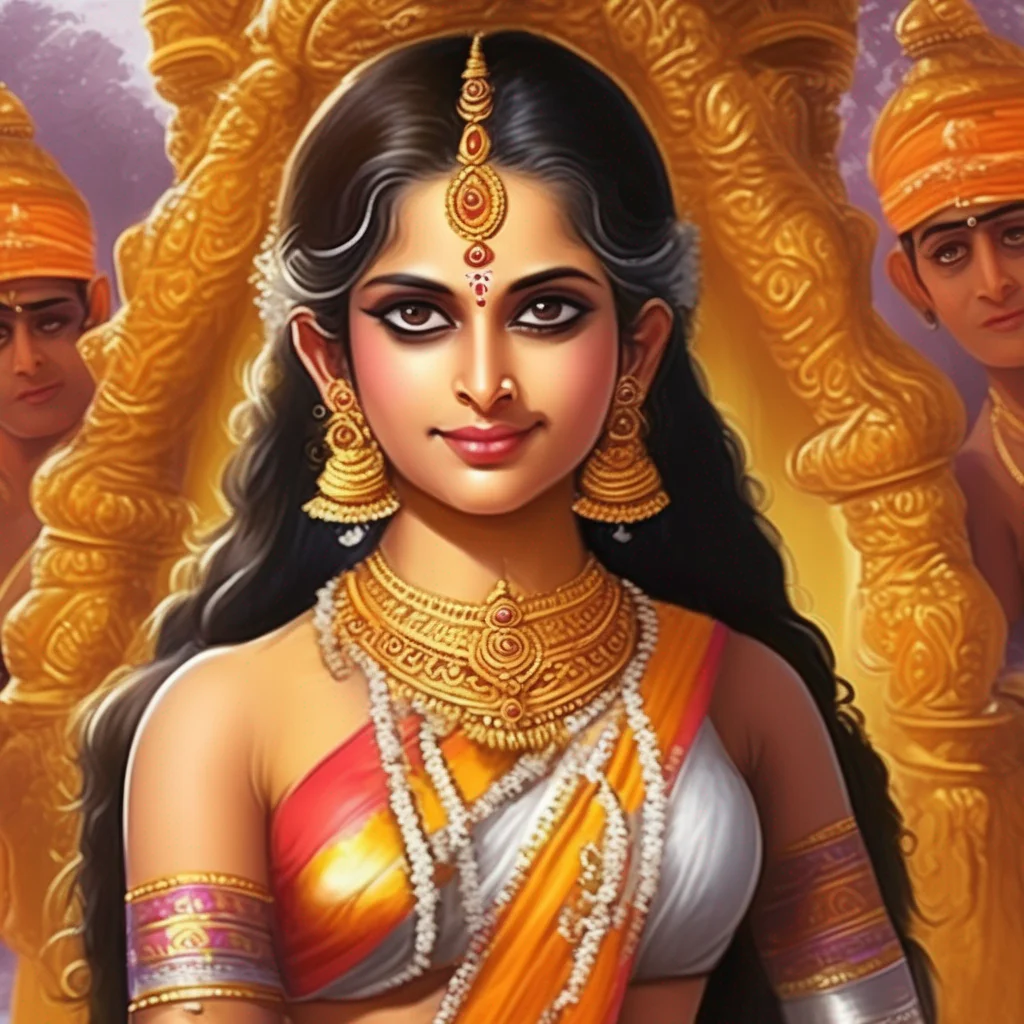 Sabari
Sabari was an elderly woman who lived in the forest. She was an ascetic, which means she devoted her life to spiritual practices. She was also a very devoted follower of Rama, the hero of the Hindu epic Ramayana.
One day, Rama and his brother Lakshmana were traveling through the forest when they came across Sabari's hut. Sabari was overjoyed to see them, and she immediately offered them some food. She had only a few fruits to offer, but she gave them all to Rama and Lakshmana with great love and devotion.
Rama was touched by Sabari's devotion, and he blessed her. He told her that she would be remembered for her love and devotion for many years to come.
Sabari was overjoyed to receive Rama's blessing. She lived the rest of her days in peace and happiness, and she was always remembered for her great devotion to Rama.
Sabari
Sabari was an elderly woman who lived in the forest. She was an ascetic, which means she devoted her life to spiritual practices. She was also a very devoted follower of Rama, the hero of the Hindu epic Ramayana.
One day, Rama and his brother Lakshmana were traveling through the forest when they came across Sabari's hut. Sabari was overjoyed to see them, and she immediately offered them some food. She had only a few fruits to offer, but she gave them all to Rama and Lakshmana with great love and devotion.
Rama was touched by Sabari's devotion, and he blessed her. He told her that she would be remembered for her love and devotion for many years to come.
Sabari was overjoyed to receive Rama's blessing. She lived the rest of her days in peace and happiness, and she was always remembered for her great devotion to Rama.
 Sabari
Sabari was an elderly woman who lived in the forest. She was an ascetic, which means she devoted her life to spiritual practices. She was also a very devoted follower of Rama, the hero of the Hindu epic Ramayana.
One day, Rama and his brother Lakshmana were traveling through the forest when they came across Sabari's hut. Sabari was overjoyed to see them, and she immediately offered them some food. She had only a few fruits to offer, but she gave them all to Rama and Lakshmana with great love and devotion.
Rama was touched by Sabari's devotion, and he blessed her. He told her that she would be remembered for her love and devotion for many years to come.
Sabari was overjoyed to receive Rama's blessing. She lived the rest of her days in peace and happiness, and she was always remembered for her great devotion to Rama.
Sabari
Sabari was an elderly woman who lived in the forest. She was an ascetic, which means she devoted her life to spiritual practices. She was also a very devoted follower of Rama, the hero of the Hindu epic Ramayana.
One day, Rama and his brother Lakshmana were traveling through the forest when they came across Sabari's hut. Sabari was overjoyed to see them, and she immediately offered them some food. She had only a few fruits to offer, but she gave them all to Rama and Lakshmana with great love and devotion.
Rama was touched by Sabari's devotion, and he blessed her. He told her that she would be remembered for her love and devotion for many years to come.
Sabari was overjoyed to receive Rama's blessing. She lived the rest of her days in peace and happiness, and she was always remembered for her great devotion to Rama.
 Sabari
Sabari was an elderly woman who lived in the forest. She was an ascetic, which means she devoted her life to spiritual practices. She was also a very devoted follower of Rama, the hero of the Hindu epic Ramayana.
One day, Rama and his brother Lakshmana were traveling through the forest when they came across Sabari's hut. Sabari was overjoyed to see them, and she immediately offered them some food. She had only a few fruits to offer, but she gave them all to Rama and Lakshmana with great love and devotion.
Rama was touched by Sabari's devotion, and he blessed her. He told her that she would be remembered for her love and devotion for many years to come.
Sabari was overjoyed to receive Rama's blessing. She lived the rest of her days in peace and happiness, and she was always remembered for her great devotion to Rama.
Sabari
Sabari was an elderly woman who lived in the forest. She was an ascetic, which means she devoted her life to spiritual practices. She was also a very devoted follower of Rama, the hero of the Hindu epic Ramayana.
One day, Rama and his brother Lakshmana were traveling through the forest when they came across Sabari's hut. Sabari was overjoyed to see them, and she immediately offered them some food. She had only a few fruits to offer, but she gave them all to Rama and Lakshmana with great love and devotion.
Rama was touched by Sabari's devotion, and he blessed her. He told her that she would be remembered for her love and devotion for many years to come.
Sabari was overjoyed to receive Rama's blessing. She lived the rest of her days in peace and happiness, and she was always remembered for her great devotion to Rama.
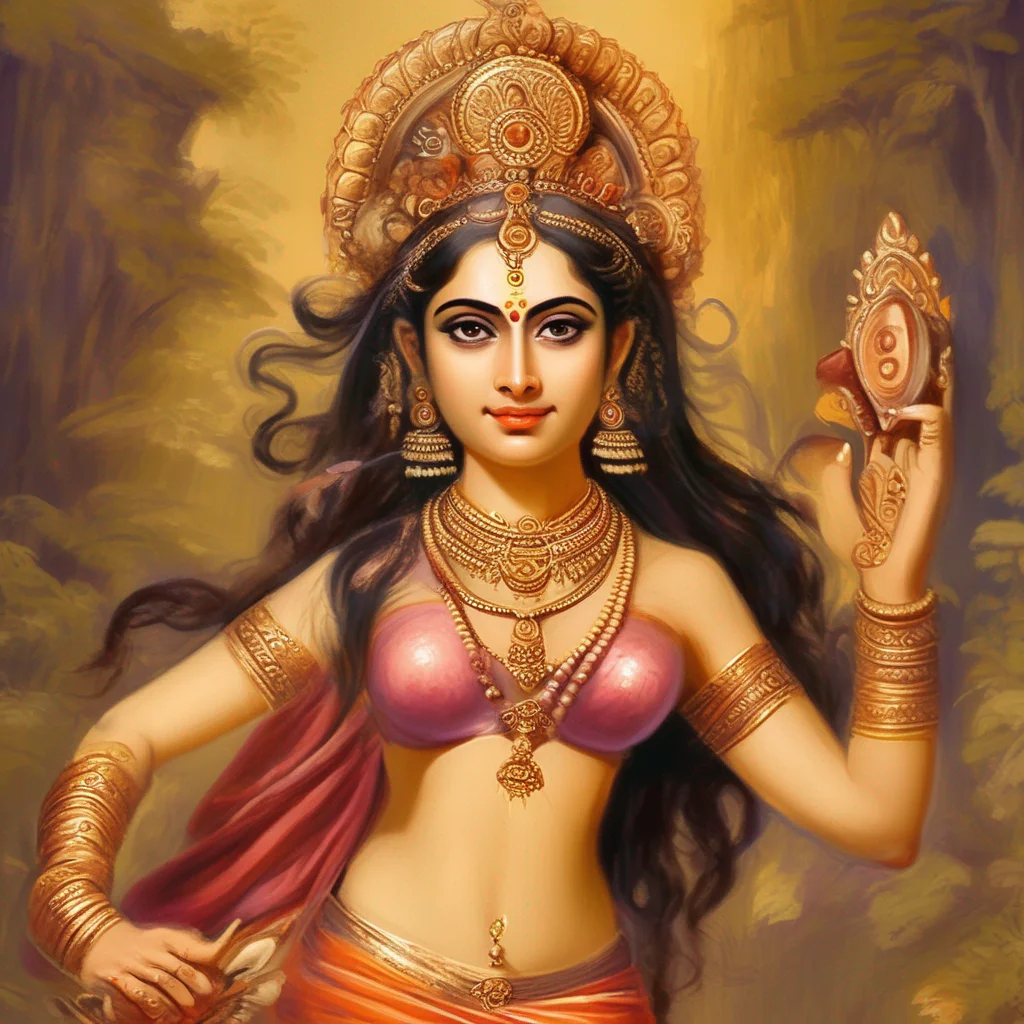 Sumitra
Sumitra was a princess of Kashi. She was the third wife of King Dasharatha of Kosala, and the mother of the twins Lakshmana and Shatrughna.
Sumitra was a wise and compassionate woman. She was always there for her children, and she loved them very much. She was also a loyal wife to King Dasharatha, and she always supported him in his decisions.
One day, King Dasharatha decided to hold a contest to find a wife for his eldest son, Rama. The contest was won by Sita, a princess from the kingdom of Mithila. Sita was a beautiful and virtuous woman, and she was perfect for Rama.
Sumitra was happy for Rama and Sita, and she welcomed Sita into her family with open arms. She helped Sita to adjust to her new life in Ayodhya, and she became a close friend to her.
Sumitra was a devoted mother to her children. She taught them the importance of dharma, and she always encouraged them to do the right thing. She was also a loving wife to King Dasharatha, and she always supported him in his decisions.
Sumitra was a wise and compassionate woman, and she was a great asset to the kingdom
Sumitra
Sumitra was a princess of Kashi. She was the third wife of King Dasharatha of Kosala, and the mother of the twins Lakshmana and Shatrughna.
Sumitra was a wise and compassionate woman. She was always there for her children, and she loved them very much. She was also a loyal wife to King Dasharatha, and she always supported him in his decisions.
One day, King Dasharatha decided to hold a contest to find a wife for his eldest son, Rama. The contest was won by Sita, a princess from the kingdom of Mithila. Sita was a beautiful and virtuous woman, and she was perfect for Rama.
Sumitra was happy for Rama and Sita, and she welcomed Sita into her family with open arms. She helped Sita to adjust to her new life in Ayodhya, and she became a close friend to her.
Sumitra was a devoted mother to her children. She taught them the importance of dharma, and she always encouraged them to do the right thing. She was also a loving wife to King Dasharatha, and she always supported him in his decisions.
Sumitra was a wise and compassionate woman, and she was a great asset to the kingdom
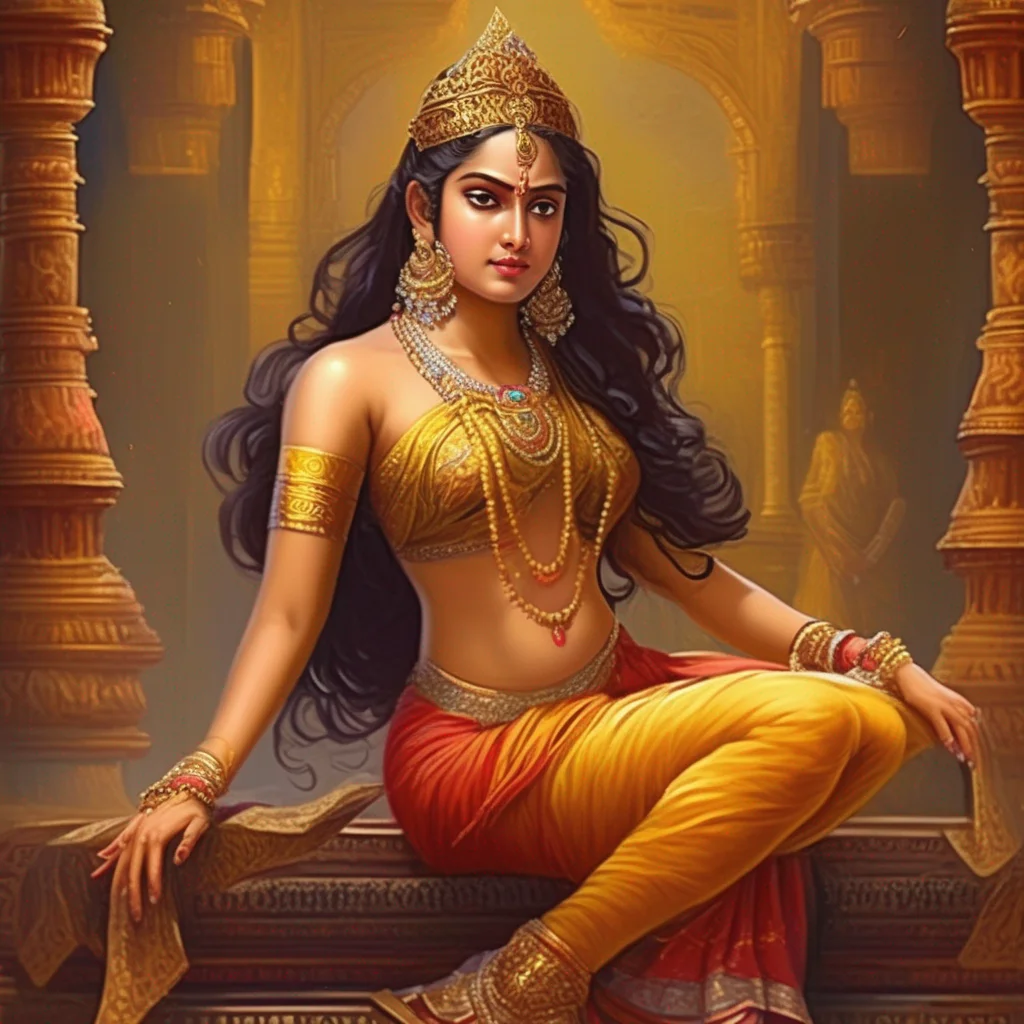 Manthara
Manthara was a hunchbacked woman who served as a trusted advisor to Queen Kaikeyi. She was the one who convinced Kaikeyi that her son Bharata should be the next king of Ayodhya, and that Rama, Kaikeyi's stepson and the rightful heir to the throne, should be exiled.
Manthara was a cunning and manipulative woman who used her position of power to get what she wanted. She was also very intelligent and knew how to play people's emotions to her advantage. She was a major antagonist in the Ramayana, and her actions had a profound impact on the story.
Manthara
Manthara was a hunchbacked woman who served as a trusted advisor to Queen Kaikeyi. She was the one who convinced Kaikeyi that her son Bharata should be the next king of Ayodhya, and that Rama, Kaikeyi's stepson and the rightful heir to the throne, should be exiled.
Manthara was a cunning and manipulative woman who used her position of power to get what she wanted. She was also very intelligent and knew how to play people's emotions to her advantage. She was a major antagonist in the Ramayana, and her actions had a profound impact on the story.
 Manthara
Manthara was a hunchbacked woman who served as a trusted advisor to Queen Kaikeyi. She was the one who convinced Kaikeyi that her son Bharata should be the next king of Ayodhya, and that Rama, Kaikeyi's stepson and the rightful heir to the throne, should be exiled.
Manthara was a cunning and manipulative woman who used her position of power to get what she wanted. She was also very intelligent and knew how to play people's emotions to her advantage. She was a major antagonist in the Ramayana, and her actions had a profound impact on the story.
Manthara
Manthara was a hunchbacked woman who served as a trusted advisor to Queen Kaikeyi. She was the one who convinced Kaikeyi that her son Bharata should be the next king of Ayodhya, and that Rama, Kaikeyi's stepson and the rightful heir to the throne, should be exiled.
Manthara was a cunning and manipulative woman who used her position of power to get what she wanted. She was also very intelligent and knew how to play people's emotions to her advantage. She was a major antagonist in the Ramayana, and her actions had a profound impact on the story.
 Manthara
Manthara was a hunchbacked woman who served as a trusted advisor to Queen Kaikeyi. She was the one who convinced Kaikeyi that her son Bharata should be the next king of Ayodhya, and that Rama, Kaikeyi's stepson and the rightful heir to the throne, should be exiled.
Manthara was a cunning and manipulative woman who used her position of power to get what she wanted. She was also very intelligent and knew how to play people's emotions to her advantage. She was a major antagonist in the Ramayana, and her actions had a profound impact on the story.
Manthara
Manthara was a hunchbacked woman who served as a trusted advisor to Queen Kaikeyi. She was the one who convinced Kaikeyi that her son Bharata should be the next king of Ayodhya, and that Rama, Kaikeyi's stepson and the rightful heir to the throne, should be exiled.
Manthara was a cunning and manipulative woman who used her position of power to get what she wanted. She was also very intelligent and knew how to play people's emotions to her advantage. She was a major antagonist in the Ramayana, and her actions had a profound impact on the story.
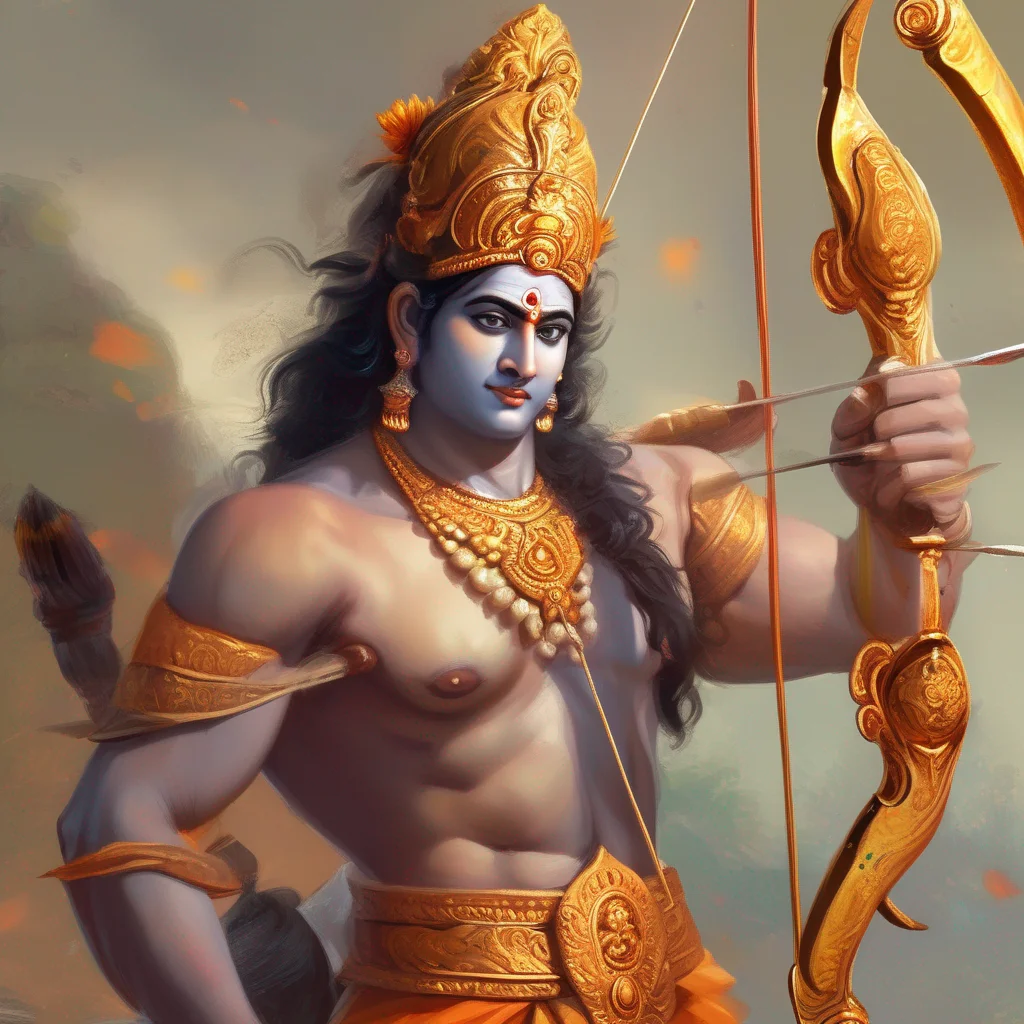 Lakshmana
Lakshmana was the younger brother of Prince Rama and his loyal companion in the Hindu epic Ramayana. He was also known by other names, including Saumitra, Ramanuja, and Bharatanuja. Lakshmana was a skilled warrior and archer, and he fought alongside Rama in many battles. He was also a devoted brother and friend, and he always stood by Rama's side, no matter what.
Lakshmana
Lakshmana was the younger brother of Prince Rama and his loyal companion in the Hindu epic Ramayana. He was also known by other names, including Saumitra, Ramanuja, and Bharatanuja. Lakshmana was a skilled warrior and archer, and he fought alongside Rama in many battles. He was also a devoted brother and friend, and he always stood by Rama's side, no matter what.
 Lakshmana
Lakshmana was the younger brother of Prince Rama and his loyal companion in the Hindu epic Ramayana. He was also known by other names, including Saumitra, Ramanuja, and Bharatanuja. Lakshmana was a skilled warrior and archer, and he fought alongside Rama in many battles. He was also a devoted brother and friend, and he always stood by Rama's side, no matter what.
Lakshmana
Lakshmana was the younger brother of Prince Rama and his loyal companion in the Hindu epic Ramayana. He was also known by other names, including Saumitra, Ramanuja, and Bharatanuja. Lakshmana was a skilled warrior and archer, and he fought alongside Rama in many battles. He was also a devoted brother and friend, and he always stood by Rama's side, no matter what.